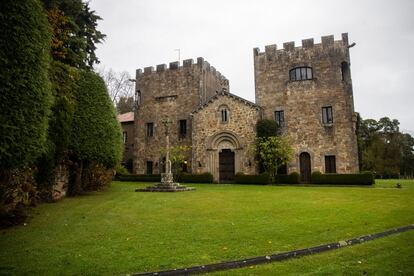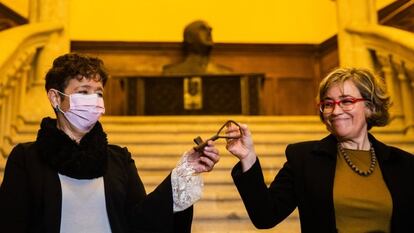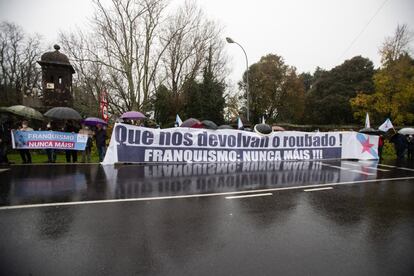Franco’s summer palace is handed to Spanish state amid legal battle
Dictator’s descendants appeal a decision that strips them of a property they used for over 80 years


After 82 years in the hands of the Franco family, a country estate known as Pazo de Meirás was turned over to the Spanish state on Thursday following a court ruling declaring it public property. The dictator’s descendants have appealed the decision.
The keys to the property, which is located in Sada, in Spain’s northwestern Galicia region, were formally handed over at a midday ceremony after experts from Spain’s National Heritage agency checked the state of the property and its contents, said sources at the regional High Court of Galicia.
The move comes after the center-left coalition government of the Socialist Party (PSOE) and Unidas Podemos began a legal battle to recover the property in July 2019. In a separate legal victory, in October of last year, the government moved Franco’s remains from the Valley of the Fallen mausoleum outside Madrid following another protracted legal dispute with the family of Francisco Franco, who led a dictatorship from 1939 until his death in 1975.
Public heritage

Deputy Prime Minister Carmen Calvo said that the property transfer “dignifies Spanish democracy and memory.” She added that “thousands and thousands of men and women had asked for this place to be part of Spain’s public heritage,” and that when the site reopens for visits, the public will come face to face with “history and the truth of what happened: with Franco’s presence, but from the viewpoint of democratic memory and democratic discourse.”
In September, a court in A Coruña ruled that the Spanish state is the rightful owner of the summer residence. Franco’s descendants were told to relinquish the Pazo de Meirás without any compensation for the maintenance costs that they claim to have had over the course of eight decades. The litigation pitted local, provincial, regional and national authorities against six of Franco’s grandchildren and their company Prístina, SL.
In her decision, Judge Marta Canales invalidated a 1938 transaction by which a group of Franco supporters donated the Pazo de Meirás to him in the middle of the Spanish Civil War (1936-1939) after purchasing it by a public subscription that the locals were forced to contribute to.
At the donation ceremony, Franco, who was himself born in Galicia, said that “I gladly accept, exclusively because it is a gift from my fellow Galicians.” Franco then went on to promise public works projects for the four provinces that make up the northwestern region. Judge Canales also ruled that Franco “simulated” purchasing the estate on May 24, 1941, in order to get the property registered in his name at the local registrar’s office in Betanzos.
New use

The property will reopen its doors to visitors “in five to six weeks,” according to Spain’s Deputy Prime Minister Carmen Calvo.
Calvo met with representatives of various government agencies to clarify what use the property will be put to. Galician premier Alberto Nuñez Feijóo, of the Popular Party (PP), confirmed on Wednesday that he has asked Prime Minister Pedro Sánchez to transfer ownership to the Galician government.
“We have requested the transfer because it was the property of a Galician family and it was bought with contributions from Galicians. And also because we know what we want to do,” said the regional leader. His plan involves bringing back the spirit of the original owner, the writer and countess Emilia Pardo Bazán, whose family built it in a style reminiscent of a medieval castle, complete with towers, and filled it with literary symbols. The property was damaged by a fire in 1978.
Lawyers representing the Spanish state said that two items, the Casa de las Conchas building and the adjoining granary, will remain in the Franco family’s possession.
“The contents of the Pazo de Meirás will stay the way they are until a final ruling is entered. There are items that are clearly personal in nature and they will be returned within the next 20 days,” said Consuelo Castro Rey, head of the Solicitor General’s Office, in a news conference where she underscored the “sense of historical justice” in the handover. “It is the return of an asset that is reaching hands it should never have left, those of the state,” she said.
The Casa de las Conchas was confiscated in 1962 under Franco’s regime from a local émigré, but the Spanish state left it out of its lawsuit because it is located outside the property’s perimeter wall.
English version by Susana Urra.
Tu suscripción se está usando en otro dispositivo
¿Quieres añadir otro usuario a tu suscripción?
Si continúas leyendo en este dispositivo, no se podrá leer en el otro.
FlechaTu suscripción se está usando en otro dispositivo y solo puedes acceder a EL PAÍS desde un dispositivo a la vez.
Si quieres compartir tu cuenta, cambia tu suscripción a la modalidad Premium, así podrás añadir otro usuario. Cada uno accederá con su propia cuenta de email, lo que os permitirá personalizar vuestra experiencia en EL PAÍS.
¿Tienes una suscripción de empresa? Accede aquí para contratar más cuentas.
En el caso de no saber quién está usando tu cuenta, te recomendamos cambiar tu contraseña aquí.
Si decides continuar compartiendo tu cuenta, este mensaje se mostrará en tu dispositivo y en el de la otra persona que está usando tu cuenta de forma indefinida, afectando a tu experiencia de lectura. Puedes consultar aquí los términos y condiciones de la suscripción digital.








































